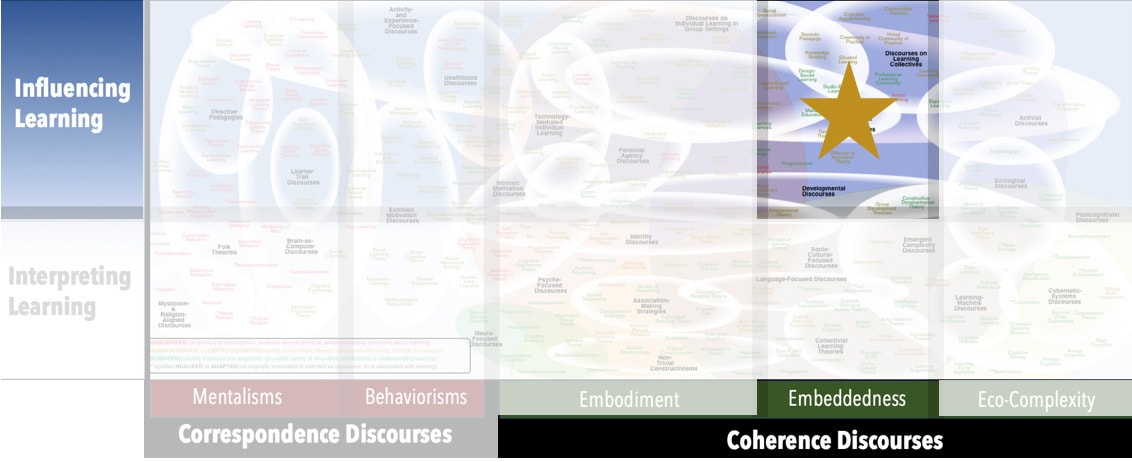AKA
Community of Learners
Focus
Group support of individual learningPrincipal Metaphors
- Knowledge is … cultural practices (that are exhibited by practitioners belonging to various communities)
- Knowing is … appropriate engagements
- Learner is … a participant in a community
- Learning is … participation in learning communities
- Teaching is … structuring and support of learning communities
Originated
1990sSynopsis
A Learning Community is a group of learners with sufficiently compatible interests, attitudes, and circumstances to support and influence one another in the pursuit of a shared goal or compatible goals – typically an advanced credential. The Learning Community model began to appear in North American institutions of higher education in the 1980s, and it is currently prominent across Europe and North America, especially among online and distance-learning programs. Subdiscourses include:- Caring Community of Learners (Catherine Lewis, Marilyn Watson, Eric Schaps, 1990s) – a model of teaching that combines the learning disciplinary knowledge with fostering a caring community of learners. Instructional strategies include drawing on resources with strong social and ethical themes and using Cooperative Learning and related strategies.
- Fostering Communities of Learners (Ann Brown, Joseph Campione, 1990s) – an instructional design based on a “research–share–perform” activity cycle and under the guidance of an expert. The approach aims to promote Metacognition by incorporating discussion of disciplinary content and providing support for critical thinking and learner reflection.
- Learning Communities in Classrooms (Kate Bielaczyc, Allan Collins, 1990s) – a model focused on the advancement of collective knowledge and skills to support the growth of individual knowledge and skills. Emphases include a common focus, diversity among members, a commitment to learning, and mechanisms from sharing.
Commentary
Advocates of Learning Communities assert that the model might encourage students to stay in school longer, amplify curricular coherence, support collaborative knowledge construction, and contribute to more current and contextually relevant learning. Evidence based on participants’ subjective experiences indicates that such claims are appropriate. More objective research into achievement gains is scant and less compelling.Authors and/or Prominent Influences
DiffuseStatus as a Theory of Learning
Learning Community is not a theory of learning.Status as a Theory of Teaching
Learning Community is more a “pedagogical design” than a theory of teaching.Status as a Scientific Theory
Learning Community is typically associated with scientific theories of learning, more commonly ones in the Socio-Cultural Theory family. However, perhaps just as commonly, the phrase “learning community” is invoked as a reference to an organizational or pedagogical strategy, independent of any reference to contemporary learning theories.Subdiscourses:
- Caring Community of Learners
- Fostering Communities of Learners
- Learning Communities in Classrooms
Map Location

Please cite this article as:
Davis, B., & Francis, K. (2022). “Learning Community” in Discourses on Learning in Education. https://learningdiscourses.com.
⇦ Back to Map
⇦ Back to List
